♫ “Set Your church on fire
Win this nation back
Change the atmosphere
Build Your kingdom here
We pray…”Rend Collective lyrics, “Build Your Kingdom Here”
♫ “This is a church on fire, this is the Holy Spirit flame
We have a burning desire to lift up Jesus’ name
Let the fire burn in every heart to light the way, defeat the dark
Let the flame of love burn higher
This is a church, this is a church on fire”Hillsong lyrics, “Church On Fire”
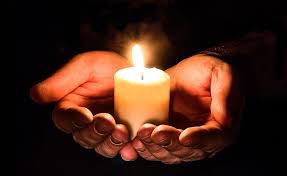 We often hear people praying for holy fire to rain down, or a fire to ignite their spirits. But does Scripture really instruct us to desire fire? That’s a question I’ve been pondering as I study the Bible. after all, doesn’t God use fire as an instrument of His wrath? Fortunately, there are some solid word studies on “fire” that we can use to help us further explore God’s Word.
We often hear people praying for holy fire to rain down, or a fire to ignite their spirits. But does Scripture really instruct us to desire fire? That’s a question I’ve been pondering as I study the Bible. after all, doesn’t God use fire as an instrument of His wrath? Fortunately, there are some solid word studies on “fire” that we can use to help us further explore God’s Word.
If you want to know WHY we may not want to pray for the Holy Spirit’s fire in our lives, you need to check out the following
Burning Away Misconceptions About “Holy Fire”
If you weren’t born into a Christian home and came to know the Lord a little later in life, you may remember your first experiences with “Christian Culture”. You discovered a whole bunch of bands that you’d never heard of, a whole new realm of celebrities, and a bunch of strange new language. Words that used to be somewhat acceptable were now taboo (i.e. certain terms associated with the bathroom), words that you never heard previously became part of your vocabulary (i.e. “Calvinism” or “eschatology”), and words that used to mean one thing now meant something else entirely (i.e. “charismatic” or “world”).
If you entered the faith via a Charismatic church (like me), one of the most quickly re-defined terms was “fire”. “Fire” used to be what you called the results of tossing a match on something flammable, or maybe something you did with a gun. Now it meant something way different. In Charismatic circles, there is often talk about “fire” of some sort: Holy Fire, Divine Fire, Heavenly Fire, the Fire of God, etc.
The idea of “fire” is basically paralleled with one or more of the following ideas: spiritual passion, having an emotionally intense worship/church service, really “getting serious” with God (or some form of personal revival), or some sort of outpouring of divine power on a person/church meeting/event resulting in a renewed passion of some sort (i.e. evangelism) or various “manifestations” of the Holy Spirit (i.e. euphoria, tongues, healings, prophecies, “miracles”, holy laughter, holy glue, holy vomiting, barking, crying, being slain/laid out in the spirit, visions, trances, screaming, physical pain, teleportation, etc.).
 I had generally gone along with the Charismatic usage of the term “fire” with regards to passion or zeal, and not really questioned it since the term is often used in non-Charismatic circles in nearly identical ways. But, as I’ve grown in my knowledge of the Lord and his word I’ve found myself continually questioning my own assumptions and understandings and going “back to the drawing board”. When we speak of “fire” in the previously mentioned ways, are we using the term in a proper Biblical sense? There’s only one real way to objectively answer the question. Let’s plug through all 430 occurrences of “fire” in the ESV (and let’s be honest: most people who use the term aren’t doing original language exegesis):
I had generally gone along with the Charismatic usage of the term “fire” with regards to passion or zeal, and not really questioned it since the term is often used in non-Charismatic circles in nearly identical ways. But, as I’ve grown in my knowledge of the Lord and his word I’ve found myself continually questioning my own assumptions and understandings and going “back to the drawing board”. When we speak of “fire” in the previously mentioned ways, are we using the term in a proper Biblical sense? There’s only one real way to objectively answer the question. Let’s plug through all 430 occurrences of “fire” in the ESV (and let’s be honest: most people who use the term aren’t doing original language exegesis):
1. There are many references to physical fire (the kind that firefighters need to put out) in the Scripture:
Genesis 22:6-7, Exodus 12:8, 22:6, 27:3, 29:14, 29:34, 32:20, 32:34, 35:3, 38:3; Leviticus 1:7-8, 1:12, 1:17, 2:14, 3:5, 4:12, 6:9-10, 6:12-13, 6:30, 7:17, 7:19, 8:17, 8:32, 9:11, 10:1, 13:52, 13:55, 13:57, 16:12-13, 16:27, 19:6, 20:14, 21:9; Numbers 3:4, 4:14, 6:18, 16:7, 16:18, 16:37, 16:46, 18:9, 19:6, 26:61, 31:10, 31:23, Deuteronomy 7:5, 7:25, 9:21, 12:3, 12:31, 13:16, Joshua 6:24, 7:15, 7:25, 8:8, 8:19, 11:6, 11:9, 11:11, 13:14, Judges 1:8, 6:21, 9:15, 9:20, 9:49, 9:52, 12:1, 14:15, 15:5-6, 15:14, 16:19, 18:27, 20:48, 1 Samuel 2:28, 30:1, 30:3, 30:14, 2 Samuel 14:30-31, 22:9, 22:13, 23:7; 1 Kings 7:50, 9:16, 16:18, 18:23, 18:24-25, 19:12; 2 Kings 1:14, 8:12, 17:31, 19:18, 23:11, 25:15, 2 Chronicles 4:22, 16:14, 21:19, 35:13, 36:19; Nehemiah 1:3, 2:3, 2:13; Job 22:20, 28:5, 31:12, 41:19, Psalm 11:6, 18:8, 18:12-13, 21:9, 46:9, 68:12, 74:7, 78:63, 80:16, 83:14, 118:12, 140:10, 148:8; Proverbs 6:27, 26:18, 26:20-21, 30:16; Isaiah 1:7, 5:24, 7:4, 9:5, 9:19, 10:16, 27:11, 30:14, 30:33, 33:12, 37:19, 44:15-16, 44:19, 47:14, 54:16, 64:2, 64:11, 66:24; Jeremiah 6:29, 7:18, 7:31, 19:5, 22:7; 29:22, 32:29, 34:2, 34:22, 36:22, 36:23, 36:32, 37:8, 37:10, 38:17, 38:23, 43:12-13, 49:2, 51:32, 51:58, 52:19; Ezekiel 1:4, 1:13, 1:27, 5:2, 8:2, 10:6, 10:7, 15:4-6, 16:21; 20:31, 22:20, 23:25, 24:10, 24:12, 28:14, 28:16, 30:8, 30:14, 30:16, 38:22, 39:9-10; Daniel 3:22, 3:24-27, 7:9-11; Hosea 7:4; Joel 2:30; Micah 1:4; Nahum 1:6; Zechariah 9:4; Malachi 1:10; 3:2; Matthew 3:10-12, 5:22, 7:19, 13:40, 17:15, 18:8-9, 25:41; Mark 9:22, 9:43, 9:48-49, 14:54; Luke 3:9, 3:16-17, 9:54, 17:29, 22:55; John 15:6, 18:18, 21:9; Acts 2:3, 2:19, 28:2-3, 28:5; Hebrews 11:34; James 3:5, 5:3; Revelation 8:5, 8:7, 8:8, 10:1, 11:5, 13:13, 14:10, 15:2, 16:8.
Anticipating objections to some of those, I’d say that there are some occurrences where “fire” is used in a metaphor, but the term “fire” itself isn’t being used as a metaphor for something else (i.e. in a simile where something is “hot like fire”, the fire being referred to isn’t itself metaphorical for something else).
2. God’s physical presence is often manifest in some sort of physical fire (at least in appearance) in the Bible:
a. God appears as a fire pot (Genesis 15:17).
b. Jesus appears as fire in (Exodus 3:2; Acts 7:30). I know what you’re thinking. You’re thinking that the text says “the angel of the Lord”, not Jesus. Well, they’re the same person. Secondly, you’re thinking “well, the bush wasn’t burned so it obviously wasn’t physical fire”. I’d dare suggest that it sure looked like real, physical fire…hence Moses saw it and wondered why the bush wasn’t burned (Exodus 3:3). The strange thing about the fire wasn’t it’s appearance, but rather that it didn’t burn the bush.
c. God appeared as a pillar of fire during the Exodus (Exodus 13:21-22, 14:24, 40:38; Numbers 9:15-16, 14:14; Deuteronomy 1:33; Nehemiah 9:12, 9:19; Psalm 105:39). I’d dare say that the fire actually looked like “real” fire.
d. God appeared as fire on Mount Sinai (Exodus 19:18, 24:17; Deuteronomy 4:11-12, 4:15, 4:33, 4:36, 5:4, 5:22-25, 9:10, 9:15, 10:4; 18:16; Isaiah 4:5; Hebrews 12:18).
e. God himself lit the first offering in the tabernacle with fire (Leviticus 9:24).
f. God himself lit the first offering in the temple with fire (2 Chronicles 7:1, 7:3).
g. God himself lit David’s offering upon altar on the threshing floor of Ornan the Jebusite (1 Chronicles 21:26).
h. God’s flaming chariots, pulled by flaming horses, separated Elijah from Elisha as Elijah ascended to Heaven in a whirlwind (2 Kings 2:11). It’s worth noting that the flaming horses/chariots kept Elisha away from the whirlwind (and the holy ground that it touched down on). Interesting detail indeed.
i. Those same flaming chariots and flaming horses appeared a second time in Elisha’s life; when Elisha’s servant had his eyes opened to see the armies of the Lord defending Elisha at Dothan (2 Kings 6:17). Now arguably, nobody knows if this was actually physical fire, but the fire was described in that way.
j. In the future, God will defend Israel from their enemies by appearing as (among other things) fire (Isaiah 29:6; Revelation 20:9).
k. The Holy Spirit manifested as seven torches (for the seven churches) in the book of Revelation (Revelation 4:5). There are questions about the appearance here, but I should point out that this one verse doesn’t exactly overturn the established pattern we’ve seen so far.
3. God’s judgment is often performed with physical fire:
a. God rained down fire on Sodom and Gomorrah in (Genesis 19:24).
b. The seventh plague in Egypt was one of hail and fire (Exodus 9:23-24).
c. God killed Nadab and Abihu with fire (Leviticus 10:2).
d. God killed some of the complaining Israelites with fire (Numbers 11:1-3).
e. God killed the 250 men offering incense in Korah’s rebellion with fire (Numbers 16:35, 26:10; Psalm 106:18).
f. God killed the 50 men sent to get Elijah with fire (2 Kings 1:10) twice (2 Kings 1:12).
g. God killed all Job’s sheep and servants with fire (Job 1:16).
h. God proves himself as God and sentences the prophets of Ba’al to death by raining fire down from Heaven on the altar of Elijah (1 Kings 18:38).
i. God’s eschatological judgment of sinners/creation will be performed with fire (2 Thessalonians 1:8; Hebrews 10:27; James 3:6; 2 Peter 3:7, 3:12; Jude 1:7; Revelation 19:20, 20:10, 20:14-15, 21:8). Though there most certainly is debate with regards to the physical nature of the fire, the usage of the term “fire” is not clearly metaphorical in the listed passages. Exploration of this issue is beyond the scope of this post and is, in and of itself, a rather large post.
4. 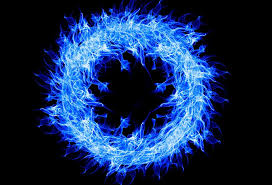 Fire is used as a relatively wide-ranging metaphor several times in the scripture:
Fire is used as a relatively wide-ranging metaphor several times in the scripture:
a. The consuming nature of fire is used as a metaphor for destruction/desolateness, either by God or Men (Numbers 21:28, 21:30; Deuteronomy 9:3; Job 20:26; Psalm 97:3; Isaiah 10:17; 26:11, Jeremiah 48:5, 49:27, 50:32, 51:30; Joel 1:19-20, 2:3; Obadiah 1:18; Micah 1:7; Nahum 3:13, 3:15; Habakkuk 2:13; Revelation 17:16).
b. The consuming nature of fire is used as a metaphor for God’s jealousy for his own glory and worship (Deuteronomy 4:24; Psalm 79:5, 89:46; Hebrews 12:29).
c. Fire is used as a metaphor for God’s judgment/wrath (Deuteronomy 33:2; Psalm 50:3, 78:21; Isaiah 30:30, 31:9; 33:14, 42:25, 66:15-16; Jeremiah 4:4, 11:16, 15:14, 17:14, 17:27, 21:10, 21:12, 21:14; Lamentations 2:3, 4:11; Ezekiel 5:4, 15:7, 19:12, 19:14, 20:47, 21:31, 21:32, 22:21, 22:31, 28:18, 39:6; Hosea 8:14; Amos 1:4, 1:7, 1:10, 1:12, 1:14, 2:2, 2:5, 5:6, 7:4; Zephaniah 1:18; 3:8; Zechariah 3:2, 11:1; Luke 12:49; Jude 1:23; Revelation 14:18, 18:8). The fire in this metaphor is certainly physical fire.
d. The consuming nature of fire is used as a metaphor to describe how wealth acquired through bribery doesn’t last (Job 15:34).
e. The extinguishing of a fire (or candle) is used as a metaphor for the fleeting nature of the life of the wicked (Job 18:5).
f. The voice/words of the Lord are compared with fire. The idea here is that the voice of the Lord flashes forth and strikes fear (Psalm 29:7) or consumes those who hear it (Jeremiah 5:14)
g. Fire is used as a metaphor for anger (Psalm 39:3; Lamentations 2:4; Hosea 7:6). The idea here is that anger consumes one just like fire consumes that which it burns.
h. Fire is used as a metaphor for suffering (Psalm 66:12; Isaiah 43:2; Lamentations 1:13; Zechariah 13:9; 2 Peter 1:7; Revelation 3:18).
i. Fire is used metaphorically to (arguably) describe something that cannot be stopped (Psalm 104:4; Jeremiah 20:9; Joel 2:5; Hebrews 1:7).
j. The destroying/consuming nature of fire is used as a metaphor for the speech of the wicked (Proverbs 16:27; James 3:6).
k. A lover’s consuming jealousy is compared with fire (Song of Solomon 8:6).
l. Fire is used as a metaphor for the consuming nature wickedness (Isaiah 9:18, 33:11, 65:5).
m. The consuming nature of fire is used as a metaphor for the tongue of the Lord (Isaiah 30:27).
n. The illuminating nature of fire is used as a metaphor for wisdom (Isaiah 50:11).
o. God’s word is compared to a fire (Jeremiah 23:29).
p. Fire is used as a metaphor of impenetrability (Zechariah 2:5).
q. Fire is used as a metaphor for testing (1 Corinthians 3:13, 3:15).
r. Fire is used as a metaphor for the eyes of Christ (Revelation 1:14, 2:18, 19:12).
s. Fire is used as a metaphor for a plague (Revelation 9:17-18).
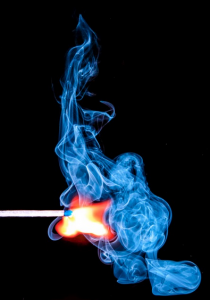 Wow. That was a lot of passages!
Wow. That was a lot of passages!
I guess I do all this work so that you don’t have to…and before anyone complains, I’m sure that I wrongly classified a few references, mostly because of the question of whether “fire” itself was being used as a metaphor or a literal component of a metaphor. I didn’t spend a ton of time looking at some of the difficult texts, but the pattern is obviously established.
For those that are interested (and I know someone will complain about this if I don’t mention it), I also checked the original languages and the Hebrew word for fire (‘esh) occurs 373 times in the Old Testament (which is actually more occurrences than in the ESV, but mostly because it’s sometimes translated “fiery” or “burning” or something like that), and the Greek (pyr) occurs 73 times (again, more occurrences than in the ESV, for identical reasons). That works out to 16 more occurrences than the ESV, so on a list of 430 references; that’s a fairly insignificant percentage (3.72%).
Points to take home:
1. The Spirit (who authored Scripture) never, ever, uses “fire” in a metaphorical sense describing passion/excitement/commitment/fervor etc. The only metaphorical usages related to emotions are of anger and wrath. That’s amazingly interesting, given the constant usage of the term in Charismatic circles. I have rarely heard a Charismatic/Continuationist use the idea of “holy fire” in reference to God’s wrath or anger. I know what you’re thinking though… I know that getting “fired up/being on fire” is an English expression of speech, but that leads to the second point.
2. The Spirit never, ever, uses “fire” in the context of cultivation of spiritual renewal/fervor/conviction. There’s never talk of “Holy Fire” in the scriptures, at least in the sense that the phrase is regularly used in charismatic circles. The phrase doesn’t even appear in the Scriptures at all.
Nowhere.
Write it down.
All this talk about “holy fire” isn’t talking about actually burning things, God manifesting his presence in physical fire, divine judgment, or any of the metaphorical uses in scripture. When people talk about “holy fire”, they’re not talking about God raining down judgment on his enemies.
So, who cares, right?
Well, consider two things:
1. When a person conflates biblical terminology and idioms with modern terminology and idioms, they twist the scriptures.
In other words, when a person takes verses like Matthew 3:11 as some sort of teaching that the Holy Spirit will give a person an intense emotional excitement/religious sincerity/fervor for God (or as a promise for the manifestation of sign gifts in a church event/service/meting), one is either mishandling or misunderstanding the scripture. That’s not a light charge, and people who teach such things will be judged for their error (James 3:1)
But wait! There’s more!
2. If you pray for God’s “fire” in your life and experience suffering, God’s giving you exactly what you asked for (Psalm 66:12; Isaiah 43:2; Lamentations 1:13; Zechariah 13:9; 1 Corinthians 3:13, 3:15; 2 Peter 1:7; Revelation 3:18).
If you think God’s not faithfully answering your prayers just because you don’t have an increase in passion or you don’t speak in tongues, you’re sadly mistaken.
Until now, you may have been misinformed and speaking out of an assumed tradition or ignorance, asking God for something you didn’t mean to ask for, and then responded in confusion when he didn’t give you what you meant to ask for (but didn’t actually request).
Now you’re informed, and all your excuses just melted.
God’s far more faithful than we give him credit for, and we’re often a lot more ignorant than we’re willing to admit.
***Please stop talking about the Holy Spirit in language that he never uses of himself.***
Please stop spreading lies about the Holy Spirit.
That’s otherwise known as “blaspheming” (and no, I’m not talking about “the unforgivable sin”…)
If you want more love for God, how about you just ask for more love for God?
If you want more passion, how about you just ask for more passion?
If you want more experiences of tongues, how about you just ask for tongues?
Don’t ask for more “holy fire” in your life; you might get cancer when God answers your prayers.
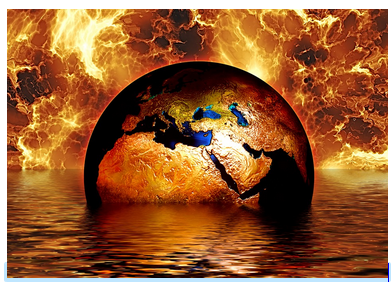

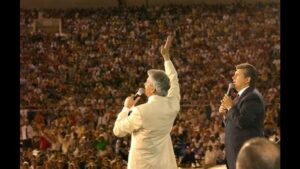


There is a video(I have it on one of my blog posts) of Heidi Baker, at Bethel, laying her hands on a young asian boy with dyed blond hair, who is silently praying, and suddenly, while she is “praying for him” he falls on the ground screaming and rolling around on the floor in agony as if he is on fire. It is deeply disturbing. I have seen the exact same thing at a Rick Joyner youth conference where the people are quietly praying, then someone lays hands on them, and they start running around the room screaming that they are on fire and are trying to put the flames out. They are in some type of demonic trance and are feeling the flames of hell.
The band Third Day has a great deal of occultic symbolism on their album covers, and when I hear their song “Soul on Fire” it makes me ill because they know most of us aren’t in on the joke.
Hi SS, reminds of Kundalini fire! Completely demonic in nature!
I have seen the video of Heidi Baker that you’re referring to and it is indeed very deeply disturbing and difficult to watch. It looks as if she targets the Asian boy the way she moved across the stage toward him. And then she said something like, “I think he’s got it” as he began to twist around in apparent agony on the floor. God have mercy on his soul for sitting under such a horrific false teacher.
I have also seen a video of Paula White laying hands on people in her congregation while yelling “fire!”
This is scary stuff to watch. People are such blind followers of today’s false teachers who create man-made ideas, terminology, visions, prophecies, dreams, etc. and try to pass it off as being from the Holy Spirit. But in these perilous times, there will be no end to the deceptions that will only deepen and darken until Jesus rules and reigns in righteousness.
Great article, a lot of work for sure! About the song lyric at the top, they are singing for God to defeat dark?! Uh, He already did that, on the cross! That’s like singing , well, I digress, you know where I am going…
Ever notice charismatics are always asking for things? God, do this, do that, give me this, do this in me and they never take any initiative? Are they expecting God to give them all while sitting in their nice Laodicean church? Things are a joke today.
They seem to forget this verse when they ask for God to expand their territory and grow their businesses:
“Ye ask, and receive not, because ye ask amiss, that ye may consume it upon your lusts.”
James 4:3 KJV
…and this:
“If I regard iniquity in my heart, the Lord will not hear me:”
Psalms 66:18 KJV
…and this:
“And this is the confidence that we have in him, that, if we ask any thing ACCORDING TO HIS WILL, he heareth us:” Jesus isn’t a personal ATM.
1 John 5:14
There’s a hillsong song with lyric “fire fall down on me”….I used to really get emotional listening to that, but deep down it freaked me out too! My mom & dad always talked about how they were, or other believers were “on fire” for the LORD. Gosh I’ve heard this my entire life. How strange. So there’s no such thing as holy fire? Isn’t God holy & so if He sends fire onto an altar, or as punishment (like the complaining Hebrews in Numbers) isn’t that holy too? I don’t think its right to ask for fire to fall down, like cuz we’re not Elijah, but idk…I agree with total misunderstanding regarding the Holy Spirit. People really like mysticism I guess….like st Therese & her ecstasies! I’m not catholic.
You fail to cite the unconsumed fire of the burning bush. Or the fire Jesus claimed to bring as the Holy Spirit. The fire within if brought forth will give you life, what you do not bring forth will consume you. One fire that doesn’t consume is God almighty.